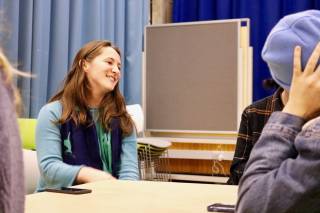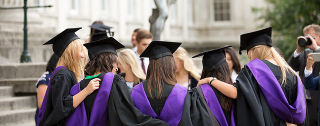Read our interviews with former students to see the wide range of careers and sectors they ended up in.
We know how important Alumni are in shaping the programmes we offer, inspiring our students and providing graduate recruitment opportunities. Find out where a degree in Medical Physics and Biomedical Engineering has taken our alumni community.
Alumni Spotlight: Dr Emma Biondetti
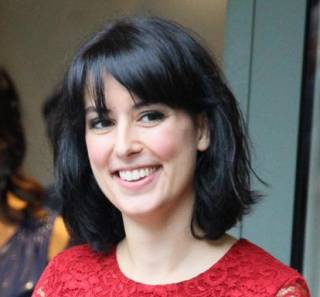
Emma Biondetti is a Postdoctoral Researcher in Quantitative Magnetic Resonance Imaging who completed her PhD in 2019 on MRI Physics. We caught up with her just over a year later to talk about her career and plans for the future, as well as her thoughts on her time at UCL.
"Thanks to this central role of UCL researchers in the MRI scientific community, I developed an excellent professional network early on, I had the opportunity of attending high-quality talks delivered by experts in my field several times per month, and, in general, I was exposed to the most recent innovations in my field."
Undergraduate Alumni
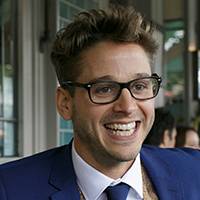
Dr Edward James
Job: Research Fellow, UCL Medical Physics and Biomedical Engineering
Graduated: MEng Biomedical Engineering, 2018
- Read Ed's story
Tell us about yourself!
I was amongst the first cohort of Biomedical Engineering students at UCL, and went on from this programme to complete a combined MRes and PhD in Biomedical Optics, also within the MPBE department. I worked at a MedTech start-up after graduation, and have recently returned to UCL as a Research Fellow.What inspired you to study in this field?
When previously working as a veterinary surgeon for five years, I became aware of the limitations and challenges that face clinicians on a daily basis. I developed a keen interest in medical technology during this time, and was also curious about how healthcare is evolving. I therefore saw the world of Medical Physics and Biomedical Engineering to be a great opportunity for me to move into.What were your career aspirations?
Since joining UCL, my career aspirations have been to operate at the interface of engineering, mathematics and medicine, and my experience within the department has definitely enabled me to achieve this. My time at UCL has encompassed everything from learning the ropes as an undergraduate, to publishing novel peer-reviewed work as part of my PhD.What working achievement or initiative are you most proud of?
Toward the end of my PhD programme I was awarded the Robert Speller prize for the best paper by a PhD student in the MPBE department, and I was also invited to present my research at a major international Biomedical Optics conference. These achievements all came together in the last year of my PhD, and I genuinely believe that the ideas that I have developed in my research will contribute to clinical translation and innovation.What advice would you give your younger self?
Starting a PhD can be an incredibly intimidating experience, but the most important thing is to follow your passion. If you combine this passion with the freedom of PhD research, then the rewards will come!Written in July 2022
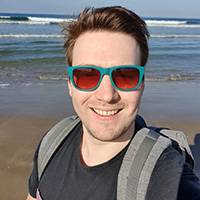
Nick Wood
Job: Product Manager, FINBOURNE
Graduated: MEng Biomedical Engineering, 2018
- Read Nick's Story
Tell us about yourself!
I did my undergrad at UCL as part of the inaugural year for the Biomedical Engineering programme. After leaving the course I undertook a graduate scheme at ION (a financial tech company) where I worked in a variety of Product, Implementation and data science roles across the Fixed Income, Cleared Derivatives and Data spaces. Just over a year ago I changed to working at a buy-side company called FINBOURNE technology as a Product Manager. I primarily work on Luminesce, our Data Virtualization system and Lusid, an investment book of records system.
What inspired you to study/work in this field?
I realised I wanted to work in a fast passed and highly varied role, which fitted nicely with a Product role in fintech. No day is the same, it can vary widely from giving demos and chatting to clients, to designing and researching new products, while still allowing me to utilise some of the coding and technical skills I gained as part of my degree.
What were your career aspirations?
My time at UCL MPBE really laid the ground skills for my career so far. The hybrid nature of the biomedical engineering degree, where you learn the ability to talk knowledgeable and learn about a very wide range of topics has really contributed to my career. The focus on both the social, and communication side along with the highly technical has also been incredibly useful.
What working achievement or initiative are you most proud of?
I was fortunate to pitch and create a series of financial indicators, several of which were subsequently published in the FT. More recently I've had the chance to scale several award-winning products and recently had the opportunity to work on designing and launching a new product.
What advice would you give your younger self when you were thinking of joining your degree programme or working in this field?
Keep learning and always asks questions. Pay particular attention to the design weeks which are part of the course, as in essence, my job is basically lots and lots of design weeks!
Written in July 2022
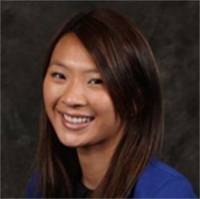
Janet Cheung
Job: Systems Engineer, Medtronic
Graduated: MSc in Medical Physics and Biomedical Engineering, 2017
- Read Janet's story
My undergraduate background is in Computer Science and Computer Engineering, but I was always interested in Biomedical Engineering, and keen to better understand both the engineering aspects and underlying principles of of medical devices - the ‘why’ and the ‘how’.
I graduated in the Autumn of 2017. Now, I work at Medtronic, a Los Angeles-based medical device company. I am a Systems Engineer in its Diabetes Business Unit developing product concept designs for insulin pumps and Continuous Glucose Monitoring (CGM) systems. This includes defining the functional and performance requirements of the system, as well as evaluating the risks and potential mitigations concerning the design.
I decided to study at UCL because of my interest in understanding the mechanisms behind medical devices. The material covered in my MSc modules gave me that understanding. Furthermore, as a Systems Engineer, I am engaged in all aspects of the product development lifecycle and often coordinate meetings with different teams. The MSc developed my ability to engage with a diverse demographic and approach problems from different perspectives—soft skills vital not only in one’s career but also in life.
As I gain more experience, I’m hoping to take on more leading roles in projects and, eventually, become a Project Manager. In the more immediate future, I want to engage in engineering outreach programs or mentorships and, hopefully, inspire students to pursue careers in the medical engineering industry. I’ve already convinced my sister!
I would advise anyone thinking about, or just starting out studying Medical Physics or Biomedical Engineering, to remain curious and to keep asking questions. Don’t be afraid or embarrassed. You will meet people come from all kinds of backgrounds and with a variety of life experiences and you will learn about facets of Physics and Engineering that you really don’t expect.Written August 2018
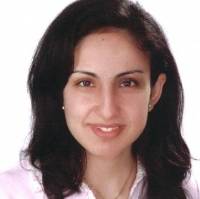
Maria Boutros
Job: Physicist, UCLH
Graduated: BSc Physics with Medical Physics, 2001
- Read Maria's story
I studied Physics with Medical Physics at UCL and graduated in 2001 with First-Class Honours. Being part of the Medical Physics department was like being in a well-connected family where nearly everyone knew each other. The dynamics of UCL’s collaborations and the network a person acquires by being part of that department is key to a student’s successful future. It was through my connections with UCL that I learnt about career options and the IPEM training scheme.
One of the best aspects of studying within the department of Medical Physics was their mentoring system. My tutor was Professor Alan Cottenden who was extremely supportive and helpful. He always had words of wisdom as well as practical steps to take in the toughest times of my course. With his tremendous enthusiasm for incontinence technology and his passion to improve the quality of life for people with intractable incontinence, he was a real inspiration to me as an undergraduate. The hybrid of physics and medicine is not theoretical but has very practical implications in improving lives.
One noteworthy incident occurred when I was asked to help a UCH midwife who was undergoing an ultrasound course and needed some help with the physics background. Cast your bread upon the waters! Years later, when I was pregnant with my first child, I accidentally bumped into her at UCLH where she gave me advice about a condition I had during my pregnancy and performed a 4D ultrasound scan on the baby - which was quite new to the NHS in those days.
UCL, with its rich diversity, enabled me to gain interpersonal skills which are crucial to working within a multidisciplinary team and with cancer patients in a Radiotherapy department. In addition, problem solving techniques, including lateral thinking and analytical abilities, were all enhanced throughout the Medical Physics modules and practical sessions.
I am currently working as a physicist in the Radiotherapy department at UCLH where we tailor cancer patients’ treatment plans specifically to the cancer and the individual to receive the optimum treatment. At UCLH, we use various modalities such as high energy photons, electrons, high dose-rate brachytherapy or low energy x-rays, or indeed a combination of modalities to treat cancer patients. We perform routine quality assurance on each treatment machine and measuring device to ensure the safety and consistency of the performance of such complex equipment. Furthermore, as a team, we are continually developing improved techniques for radiotherapy treatment such as stereotactic ablative radiotherapy, deep-inspiration breath hold technique, and pediatric high dose-rate brachytherapy, to name a few.
In the future, I would like to work in Radiotherapy departments in Africa on a voluntary basis. Most of the time, these hospitals have the technology but do not have the expertise to use it safely and clinically. My ambition is to be able to inspire and implement the advanced techniques and use of technology in such parts of the world.Written on March 2019
Postgraduate Alumni
Ryan Lamb
Job: Management Consultant, KMPG
Graduated: MSc Physics and Engineering in Medicine (Medical Image Computing), 2015
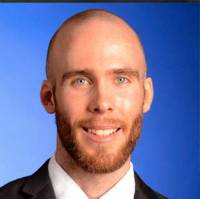
- Read Ryan's story
I did my undergraduate degree in Physics in South Africa and shared some classes with students studying Medical Physics. I didn’t know much about it, so they introduced me to their head of department. We got talking, and I discovered that Medical Physics is a great mix, combining a highly technical discipline and real-world application that directly benefits society.
I trained and qualified as a Medical Physicist in South Africa and worked for a couple of years in public and private hospitals, mostly in radiotherapy but also in nuclear medicine and diagnostic radiology. When I decided I wanted to upskill in medical image computing, UCL was the obvious choice. It is one of the best universities in the world, has a fantastic location, and offers a specialism in Medical Image Computing. When I was fortunate enough to receive a scholarship to UCL, the opportunity was too good to pass up, so I handed in my resignation and went back to being a student again.
I loved studying in central London. It has a fantastic buzz, and there were almost as many countries represented in my class as there were students. I’m still very good friends with some of my former classmates. One is currently qualifying as a radiologist in Oxford and the other works for a radiotherapy start-up in Silicon Valley.
After graduating, I joined KPMG in their Management Consulting team, starting off in Bristol, and then transferring to the London office. I now work within their Government & Healthcare Analytics team, focusing primarily on using data analytics and business intelligence for data strategy, operational improvement and cost savings in healthcare. The skills I learned on the MSc – rigorous, logical thinking, how to structure a problem to reach the desired outcome, and how to frame complex answers in a coherent, accessible way – have been invaluable in consulting, where you are often dealing with a multitude of ambiguous problems on behalf of your clients.
Working for a global firm like KPMG is hugely rewarding. You’re always being pushed, always working on new projects, always stimulated and challenged. It’s good to know that between the experience I’m gaining in consulting and the skills I gained at UCL, I have a robust and well-rounded toolkit.At every stage of my career, I’ve appreciated having mentors who guided and advised me, so I became involved involved in the UCL Alumni mentoring scheme as a way of giving back to students who may be in a similar position to the one I was in. I’ve met ambitious, interssting students who have been able to teach me new things as well, and it’s great to know hat I’ve been able to help someone make a well informed career decision.
The UCL Alumni community contains an extensive database of alumni who have gone on to achieve wonderful things across the world – the pure diversity of skillsets and experiences is invaluable and mentees should be able to find someone who has already had a career path similar to one they would like to follow. All they need to do is reach out
I plan on sticking around in consulting for the time being, and I’m keen to develop my career within the applied data analytics and innovative technology space helping to solve pressing social problems.
I would advise anyone considering studying Medical Physics to try and gain practical experience and a good understanding of real-world Medical Physics before and during your studies. Reach out to current medical physicists and ask to shadow them – you’ll have a clearer idea of which specialisation you’d prefer, and it will enhance both your time at UCL and your CV for when you graduate. Having practical experience before coming into the programme really helped me to contextualise and ground the coursework.Written August 2018
Doctoral Alumni
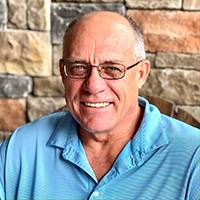
Dr Niek Schreuder
Job: CSO, President – Proton Therapy, Leo Cancer Care, Ltd
Graduated: PhD Medical Physics and Biomedical Engineering, 2020
- Read Niek's Story
Tell us about yourself!
I studied Medical Physics in South Africa and completed a MSc (med) degree in 1992 through the University of Stellenbosch Medical school. I worked as a Medical Physicist in proton radiation therapy in South Africa and moved to the USA in 2001. I decided to register for a PhD in Medical physics at UCL in 2016 and successfully defended my thesis in Sept 2020. The title of my thesis was “Technological Developments Allowing for the Widespread Clinical Adoption of Proton Radiotherapy”. The work was based on many years of experience in proton therapy and recent advances in the field. I am now serving as the Chief Scientific Officer for LEO Cancer Care which is based in the UK and USA.What were your career aspirations?
My career was already well established when I registered for my PhD at the age of 56. The PhD however is a great reward and the crown on my career in proton therapy. It opens more doors than ever before and was the right decision at that stage of my career. Prof Gary Royle and the UCL team was exceptional in their support and motivation to get through the project.What working achievement or initiative are you most proud of?
My work in developing proton therapy and making it available to more patients world wide through technology and efficiency improvements. Having a PhD in the field helps me to even do more in this regard.Written August 2022
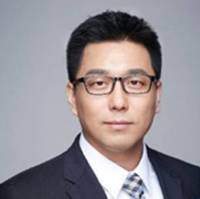
Dr Zihua Su
Job: Vice President, Beijing Aerospace Changfeng Co Ltd
Graduated: PhD Medical Physics and Biomedical Engineering, 2008
- Read Zihua's story
I was always fascinated by the science of image processing, and how it can help people, especially patients. I chose to study Medical Physics because I believed it would provide me with the kinds of skills employers prize. You learn to solve, and manage healthcare-related challenges from a multidisciplinary perspective and the competencies you acquire give you a definite career advantage.
I chose UCL because it is one of the world’s top universities, and the Medical Physics Department is one of the longest established in the world, with an excellent reputation for its research and teaching. It was definitely the right decision. I was taught by the very best in the field. My first supervisor was Andrew Todd Pokropek, who made the first PET scanner in Europe, and my second supervisor, Tryphon Lambrou, became my best friend in the lab. I really enjoyed mixing with people from different cultures and backgrounds. UCL is great for that.
After I got my PhD, I did a short internship at Siemens Research Princeton, before returning to China where I took up research positions at Mindray and Siemens. After that, I moved to GE to pursue a marketing position with some extra science and clinical applications. Now I am Vice President of a stock listed company with two medical businesses directly reporting to me.
Medical Physics is not easy. But it not only equips you with new knowledge, but the tools, techniques and confidence to apply that knowledge to a wide range of problems. Life is full of challenges, unhappiness, and negative stuff. But you have to get through it, be strong, and prepare yourself for the future. A degree in Medical Physics gives you the resilience you need when the going gets tough.Written August 2018
 Close
Close


